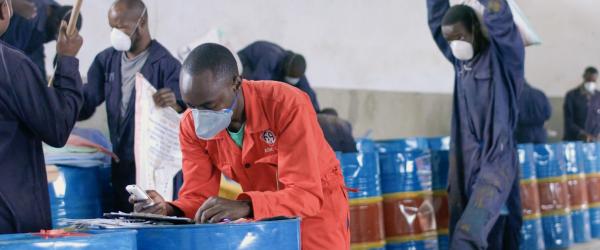15 novembre 2023 - Marseille
Projection-rencontre et Masterclass de la Chaire d'Excellence A*Midex en Anthropologie Audiovisuelle
1/ Masterclass avec Petna Ndaliko sur le thème "Archives in decolonial cinema practices" (english presentation), en collaboration avec Cécile Vandenavenne, IMAF.
👉 Mercredi 15 Novembre de 9h à 12h, Salle C de la Vieille Charité, 2 rue de la Charité, Marseille
Places limitées, donc réservation obligatoire (avant le 14 Novembre) via l'adresse: tatiana.MEDVEDEVA@univ-amu.fr
2/ Projection-rencontre avec Petna Ndaliko, autour de ses films KAPITA et MATATA et d'autres films réalisés dans le cadre de l'école de cinéma Yolé qu'il a fondé à Goma, Congo.
👉 Mercredi 15 Novembre à 19h au Polygone étoilé, 1 Rue François Massabo, 13002 Marseille. Entrée gratuite. Bar sur place.
Petna Ndaliko est cinéaste et activiste congolais. Ses œuvres artistiques multigenres sont connues pour leur style artistique afrofuturiste décolonial, qui utilise un contenu historique pour aborder des questions sociopolitiques et culturelles contemporaines. Ses films ont été montrés entre autres à la Berlinale, le Festival de Rotterdam et le FID. Il vient d'avoir un hommage pour son oeuvre à Arsenal, Berlin.
Petna vit entre les Etats-Unis et le Congo. Fondateur et directeur artistique du centre culturel Yole! Africa et du Festival international du film du Congo, il enseigne et consulte régulièrement des organisations internationales pour lutter contre les inégalités sociales et politiques des jeunes par la culture et l’éducation.
Informations détaillées sur les films projetés au Polygone étoilé:
KAPITA - 22 min - 2020 - Sans dialogue
“Ka-pi-ta”is the official job title given to Congolese charged with enforcing their white master’s bidding—through domination—over their fellow Congolese on plantations, in factories, in commerce, and other sites of capitalist extraction and production.
By recoding archival footage and intertwining it with contemporary images, Kapita exposes patterns of extraction and burial to decode colonial representations—and exploitation—of central African land and people and mines the archival films for what they make invisible: the black-skinned workers evaporated by cameras calibrated to white, the collateral death and destruction interred in infrastructure.
MATATA - 37 min - 2019 - Sans dialogue
Matata draws up an inventory of Africa and the legacy of its representations. Speech is confiscated, and the man and woman wander without ever being able to vocalise the violence that they were witness to or victim of. Right from the outset, photography, and with it, cinema, are as much a predatory technique as an instrument of beauty: ethnographic documents filmed by the coloniser, or historical images of those who played a part in decolonisation, now dead and neutralised in museums…
Faced with this history of exploitation, bodies resist. When speech is absent, music takes the floor, and choreography invades the living spaces – a group of young men improvises a dance in a jeep that’s stopped at the traffic lights, an exploration of ruins becomes an intricate ballet between people looking for each other, and even an ancient ceremonial dance is reconnected with concealed history. Or how, with a reifying gaze, the possibility of becoming the subject is apparent once again.

